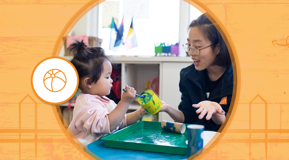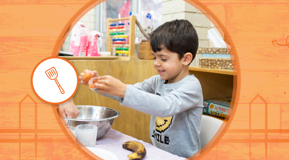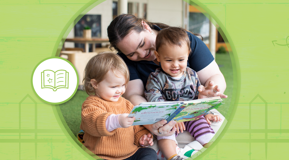Developing literacy skills

Literacy skills begin developing right from the start and are supported through everyday interactions like singing songs, sharing books, storytelling, and talking to one another. During the first five years of development, we use the term emergent literacy to describe these important fundamental skills and behaviours that are an important part of the foundations of learning to read.
3 core skills that help children to learn
1. Listening
Listening is a very important skill for children to learn. Early literacy skills are about listening and speaking. Being exposed to a language-rich environment is an important part of early learning.
Here is an activity you might like to try at home
Hide an alarm clock as a game. The child/ren need to rely on their listening skills by focussing in on the sound of the alarm while filtering out all the other noises in their environment.
If you use Apps ‘I hear Ewe’ offer children the opportunity to develop their listening skills https://apps.apple.com/au/app/i-hear-ewe/id304093970
2. Rhyming
In order to learn phonics and sight words, it is important to be able to discriminate sounds and rhyming patterns.
Here is an activity you might like to try at home
Read stories with a rhyme in them and draw attention to the rhyme for example, in the children’s book ‘Hairy Maclary’ the dogs are referred to in phrases that rhyme – ‘Hercules Morse as big as a horse’. The children could add other words that rhyme here.
3. Words and sentences
Drawing attention to words and utilising the opportunities within play to include writing and symbols with meaning is a great way to build up children’s literacy skills.
Here is an activity you might like to try at home
Help children put their thoughts on paper by being their scribe. eg: write down the rules to a new game they have invented.
Ideas for connecting literacy in everyday play could include:
- Choosing books that are good quality and include a range of text…storybooks, factual books, picture books, maps, etc
- Don’t limit where books are or how they are used
- Make sure books are readily accessible
- Model how books are read when reading to them with children such as point to the print as well as the pictures
- Make books with children that are of their own and their interest; encourage writing in a playful way and in context. Remember scribbled writing and pretend is the first stage
- Make sure there is a variety of and accessible materials….including stationery, stamps, envelopes, etc
- Provide opportunities for them to copy what you do….. this can include practising their name
- Invite kids to have a sentence or story attached to their work/paintings/etc
- Use props in play that allow children to recount stories and role play. E.g. dress ups, felt boards, etc
- Make up silly rhymes and riddles
- Write and send letters
- Display and talk about maps









